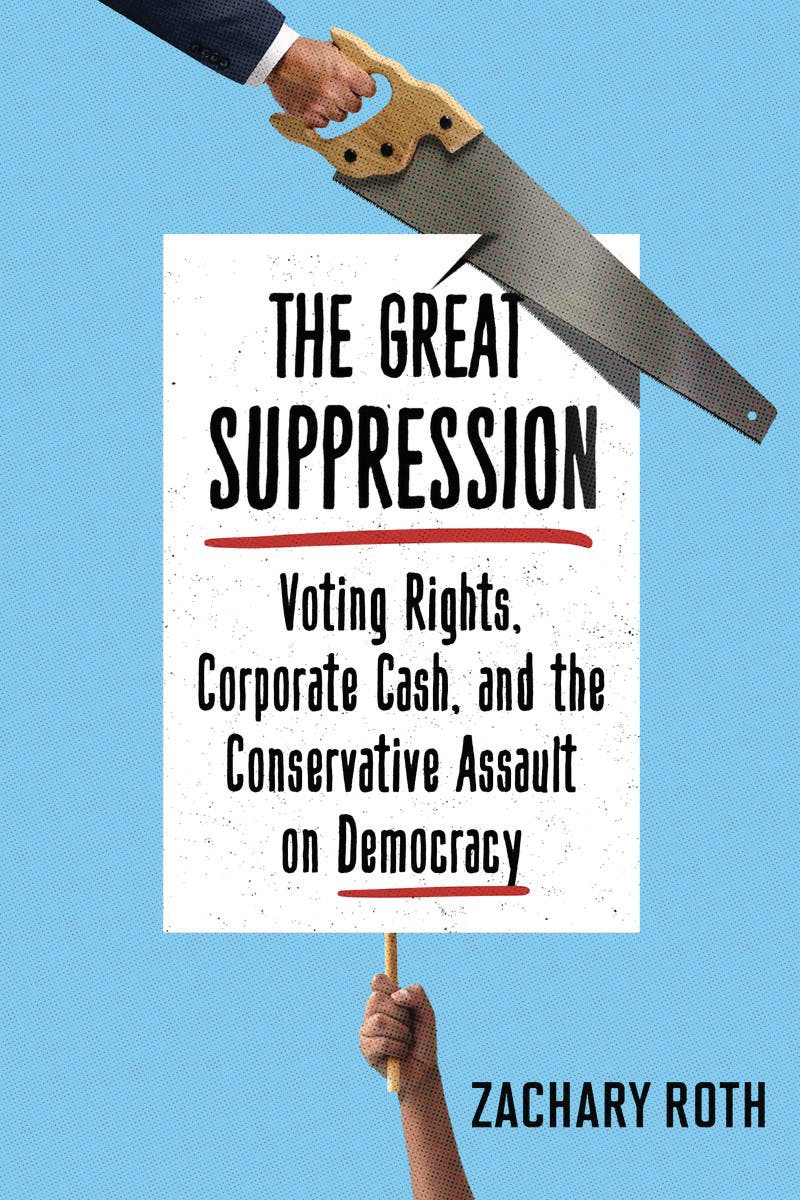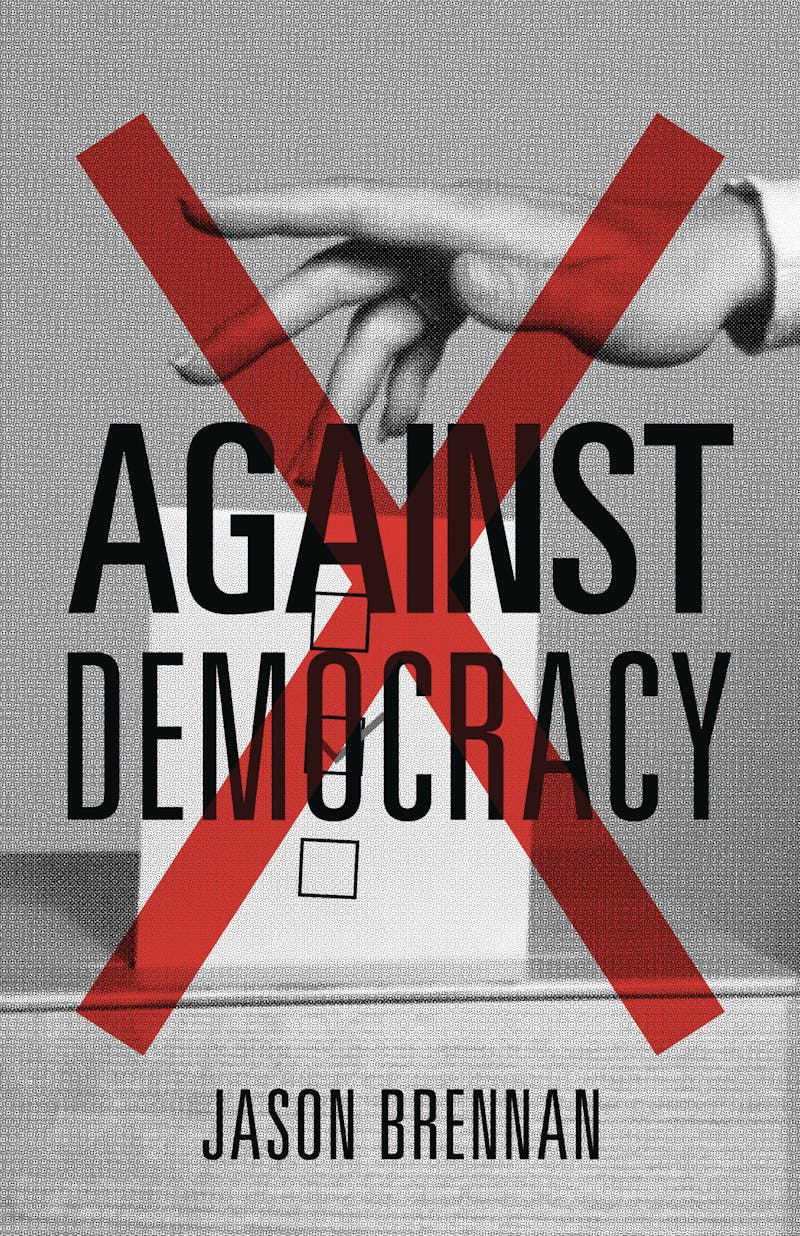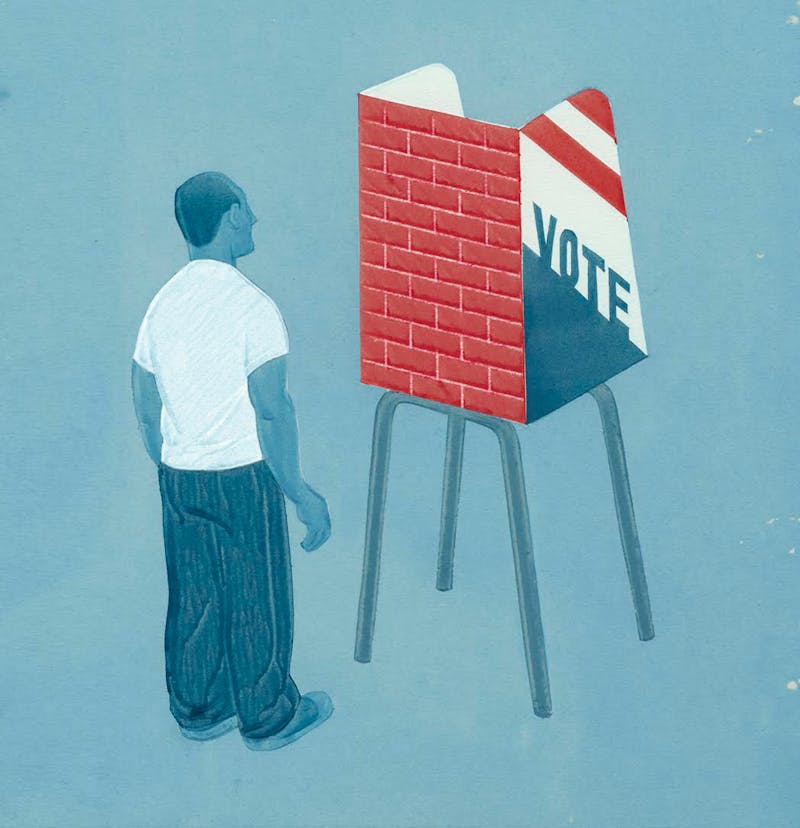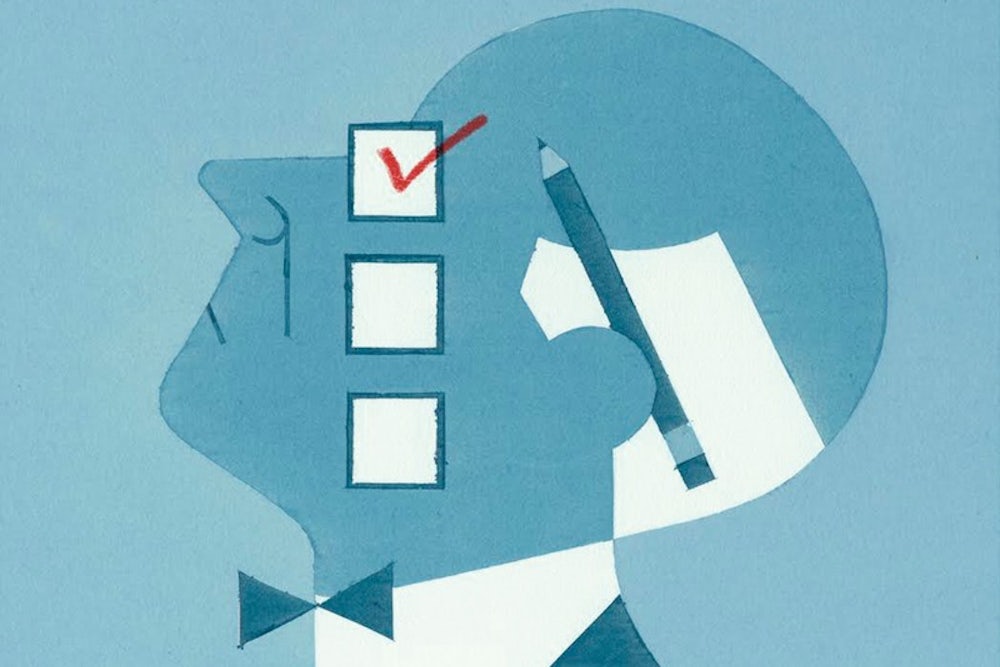According to the editorial board of The Washington Post, Donald Trump is “a unique and present danger” to American democracy. By mobilizing racial resentments, Trump has spread “poisons throughout the system that could linger beyond his defeat,” Jonathan Chait avers. Andrew Sullivan wonders if we are ripe for tyranny and concludes that, alas, we are. At stake in the outcome of the 2016 presidential election, it seems obvious to many observers, is the future of democracy itself.
Like so much else surrounding this remarkable race, however, Trump’s threats against democracy, far from being unprecedented, fit perfectly in line with the party that nominated him. As Zachary Roth documents in The Great Suppression: Voting Rights, Corporate Cash, and the Conservative Assault on Democracy, Republicans, who rarely devote much time to policy, are rather zealous about politics—and are especially eager to deprive their opponents of the right to vote. “I don’t want everybody to vote,” conservative activist Paul Weyrich proclaimed as early as 1980. “Our leverage in the elections quite candidly goes up as the voting populace goes down.” One can read the last three or four decades as a never-ceasing effort on the part of the Republicans to turn Weyrich’s dream into reality.


Conservatives have been helped in this regard by the fact that for most of American history, we were not very democratic at all. In 1965, Congress passed the Voting Rights Act, which granted the federal government the authority to prevent states from discriminating against minority voters. That step, even if it stopped well short of declaring a national right to vote, did away with literacy tests, poll taxes, and other nefarious ways of restricting the black franchise. America finally began to realize the principle of one person, one vote—a bedrock requirement for democracy. Yet even that proved too much for conservatives to bear. In 2013, five justices on the Supreme Court declared the implementation provisions of the Voting Rights Act unconstitutional. In so doing, they gave a green light to right-wing activists intent on shrinking the electorate even further. Despite the title of Alexis de Tocqueville’s famous book, which appeared in 1835, democracy in America did not arrive until 130 years later—and when it did, it lasted just 48 more.
The Republican campaign against democracy, Roth demonstrates, continues on a variety of fronts. Koch-sponsored laws that allow states to block cities from regulating businesses within their borders have become commonplace: Oklahoma even passed a ban on fracking bans. Federalist Society lawyers have waged a long and successful campaign to redefine “free speech” to include unlimited campaign contributions. Republicans in the Senate have informally amended the Constitution to make the filibuster—a tactic intended to undermine majority rule—the regular order of business. Sophisticated, computer-driven gerrymandering has all but eliminated actual competition in elections to the House of Representatives. Intent on undercutting Democrats’ advantage in the electoral college, conservatives are pushing to give rural districts greater representation in urban states, as if the only “real” Americans are farmers. Such efforts to suppress the vote amount to a confession of defeat—an acknowledgment by the right that any fair vote is one they will lose. Democracy, simply put, is not important to them; liberty—and especially liberty for business—trumps it every time.
Conservatives don’t care whether any consistent theory of government underlies these disenfranchisement efforts. It was once second nature for the right, Roth reminds us, to praise local governments, even as conservatives now try to handicap them. Conservatives use the initiative and the referendum, reforms pioneered by progressives, as a seemingly democratic means of rendering duly passed legislative decisions null and void. Others can fight over what the rules mean. Conservatives want to bypass the rules.
If only some are granted the right to vote, who should be among the favored? For most of our history, race provided the answer. But we are in a new era. Of course conservative whites, especially in the South, still hope to disenfranchise blacks. But why stop there? Republican defenders of voting restrictions insist that it is not only blacks who are being barred from the polls but a wide range of Democrats, from college students to former prisoners to the elderly, as if that makes everything hunky-dory. Some Republicans have suggested reinstating property ownership as a condition for voting, while Senator Ted Cruz urges the repeal of the Seventeenth Amendment, to allow state legislators, rather than voters, to choose U.S. senators once again. The fiction that restrictions on voting are designed to prevent fraud, now that so little of it has been found, has been dropped.
For Jason Brennan, a professor of strategy, economics, ethics, and public policy at Georgetown, the answer lies in sorting Americans by their level of education. His book, Against Democracy, argues for the establishment of an epistocracy, or rule by the wise. Under his scheme, your race is irrelevant, as well as your gender, social class, ethnicity, or even party. If you are informed about politics, you get to vote. If you are not, too bad. “Epistocracy,” in his words, “means the rule of the knowledgeable. More precisely, a political regime is epistocratic to the extent that political power is formally distributed according to competence, skill, and the good faith to act.”

Since epistocracy went out of favor when Aristotle criticized Plato’s “philosopher king,” Brennan cannot rely on the tools of political sociology, such as comparing one already existing society to another, to judge the pros and cons of epistocracy. Instead, imagining himself a thinker on par with the political philosopher John Rawls, he creates absurd thought experiments and argues syllogistically, as if, contrary to Justice Holmes, the life of the law is logic, not experience. He litters his book with phrases like “imagine that” or “suppose that,” sometimes multiple times in a single paragraph, and frequently asks us to ponder the havoc imaginary “evil demons” could wreak, if only they had the power. This is the kind of high-flown political theorizing that never manages to land on earth.
Brennan identifies himself as a libertarian, though he modifies that term with the words “bleeding heart.” Taking him at his word, his new book goes a long way toward confirming the proposition that libertarians, whatever the state of their hearts, are deeply elitist. Having not been tempted by libertarianism since I was a teenager, I could never imagine myself writing a sentence such as this:
I justifiably believe that I—a named professor of strategy, economics, ethics, and public policy at an elite research university, with a Ph.D. from the top-ranked political philosophy program in the English-speaking world [note: He means the University of Arizona] and a strong record of peer-reviewed publications in top journals and academic presses—have superior political judgment on a great many political matters compared to many of my fellow citizens, including to many large groups of them.
Aristocrats would limit voting to those with the correct breeding. Property owners naturally want property qualifications. Academics who are libertarians prefer IQ tests.
As a libertarian, Brennan distrusts positive liberty, or the ability to use government to improve the life chances of the many. That, in turn, is because he is possessed with an extreme hatred of politics. Through politics, or so Brennan argues, my actions contribute to the capacity of the state to impose its will on others. By threatening to abolish “an ideal of mutual respect and regard” between citizens, it presents an evil in itself. You and I can get along perfectly well if we enter into agreements by ourselves, but let politics get between us, and we are doomed to endless conflict. “On election day,” he writes, “as my neighbors vote, they become my enemy, and I become theirs.”
There is more along these lines. In nature, no one dominates anyone else; lacking politics, we are all equal with each other. But the emergence of the state not only results in some people having power over others, it also enables the worst among us, at least in non-epistocratic polities, to prevail over the best. Why should smart people (us) have to put up with ignoramuses (them) who, lacking all our manifest talents, seek to enslave us in their idiotic designs? The knowledgeable should possess the authority to interfere with the life prospects of the uninformed even if the latter, lacking the proper epistocratic qualifications, can have no reciprocal power over them. Let plumbers be good at plumbing. Only those who can name the capital of Zimbabwe can be good at voting.
Unlike philosophers he otherwise admires, such as John Stuart Mill, Brennan rejects any moral arguments in defense of democracy. Democracy is not to be valued because it asserts the fundamental equality of all citizens, encourages them to discover their “better angels,” improves their capacity for communication, helps to make them virtuous, or acts as a foil against totalitarianism. The only question we should ask of democracy, he claims, is an instrumental one: How well does it perform? As he repeats all too many times throughout his book, democracy is a hammer. If it does a good job driving in nails, it is a good thing. If through carelessness or disuse it becomes rusty, we need to find a new one. You would not ask of a hammer if it makes the contractor using it a better person. You should therefore not ask the same of democracy.
Any suffrage-restricting regime will have to address the question of how we determine who gets to vote, and Brennan has an answer: Just as we test for who can drive, we ought to rely on exams to determine who can have the franchise. To this there is an obvious objection. Tests rarely conform perfectly to the quality they presume to measure. I can fail at geography but nonetheless have good political judgment, just as a political whiz kid who knows the names of every member of Congress could also lack social graces. Any scheme for limiting democracy contains biases. One of the advantages of extending suffrage as widely as possible is that you limit the biases to as few as necessary.
There is, additionally, another major flaw in Brennan’s advocacy of special rights for smart people: The only way to establish an epistocracy is by blatantly non-libertarian means.
Libertarians love the outrageous, so it should not be surprising that many of them question whether the state should be involved in, say, issuing licenses for marriage or for driving. At the libertarian convention this year, Gary Johnson, who eventually received the nomination, was the only candidate in favor of requiring driver’s licenses, and for that he was heavily booed. Gay marriage? Let anyone hitch up without seeking the approval of the state. Beauty salons? Those who want to enter the business should not need the government’s approval. Your libertarian chops can always be judged by how far you are willing to go to find a seemingly harmless governmental activity, which you then roundly denounce.
From such a perspective, the whole idea that government should be in the business of judging between eligible and ineligible voters is as preposterous as it is cumbersome. Nonetheless, Brennan goes there. “Just as in most parts of the United States one cannot become a judge without having demonstrated some basic level of legal knowledge (for instance, by getting a law degree), an elite electoral system requires citizens to earn a license to vote (and perhaps also to run for office).” Since it is a libertarian conviction that every governmental act requires compulsion and engenders bureaucracy, an epistocracy test would quickly transform itself into the need for a government bureau, complete, one assumes, with civil servants to read the exams and assign a grade, companies to offer training for those being tested, lawyers to challenge unwanted decisions, proctors to prevent cheating, and frequent retesting to adapt to practical knowledge that continually changes. That a libertarian would propose what amounts to the creation of a Department of Electoral Affairs suggests that maybe something is amiss in his analysis.
Despite—or perhaps because of—his disdain for politics, Brennan is ignorant of how politics actually work. “In the United States,” he writes, “the Democratic Party has an incentive to make the exam easy, while the Republicans have an incentive to make the exam moderately hard, but not too hard.” He has clearly not been paying attention. In Donald Trump’s America, low-information voters cling to the Republicans, while Democrats are becoming the party of the informed. If you are a liberal, you might consider applauding a scheme to allow 02138 (Cambridge, Massachusetts) more power than 38944 (Leflore County, Mississippi). For Brennan, this is not a problem: His faith in an epistocracy is firm, and let the chips fall where they may, even if the wise turn out to be the most liberal. But it does seem problematic that a libertarian proposes a voting scheme that would give power to the least libertarian sections of the country. Follow Brennan’s advice, and the whole country will eventually become the People’s Republic of Cambridge—and that, I can tell you from personal experience, is no libertarian paradise. (Just try not sorting your garbage here.)
For reasons difficult to comprehend, Brennan ends the book with an homage to Edmund Burke, the philosophical founder of modern conservatism. Brennan wants Burke on his side for prudential reasons: He knows that creating an epistocracy would radically upend the status quo, and so he urges moving forward with Burkean caution. It’s as if Brennan wrote his entire book, only to grasp at the end how radical his thesis really is.
Yet the irony of a libertarian citing Burke is too delicious to pass by. Burke certainly advised against radical change. But he also hated the economists—the logical, rational, abstract thinkers of his day. The most famous two sentences in his Reflections on the Revolution in France, after proclaiming that “the age of chivalry is dead,” condemn the success of “the sophisters, economists, and calculators” for taking all the grandeur out of the world. I have a pretty good idea of what Burke, were he to appear among us today, would think of modern democracy; it would not be good. But I know for sure what he would think of Jason Brennan and his libertarian thinking: Replace “all the decent drapery of life” with “the offspring of cold hearts and muddy understanding,” Burke wrote, and there can only be one result: “In the groves of their academy, and the end of every vista, you see nothing but the gallows.”
